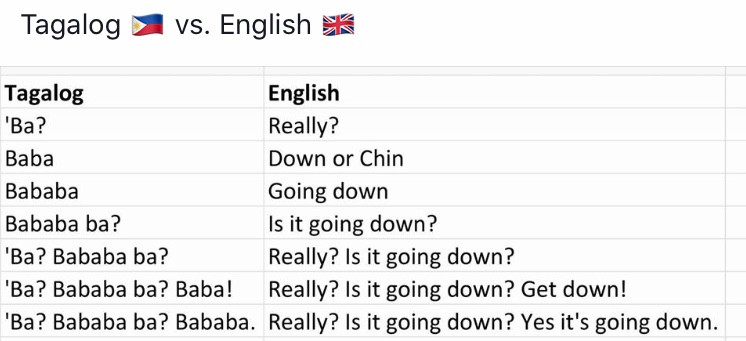Refinements and clarifications.
1. “Baba” can mean either “down” or “chin”, but they are pronounced differently.
Bab
â = down (This “bab
â” may either be the shortened imperative form of “bumab
â” or the clipping of “i” in “ibab
â”).
Bab
â! = (You) Come down.
Ibab
â/Bab
â mo ang boses mo. = Lower/Bring down your voice.
B
abà = chin (This may also mean “lowness”.)
Ah
itin mo ang b
abà mo. = Shave your chin.
Ang b
abà ng boses ni Mary. = Mary has a very low voice.
2. “B
abab
à” or “babab
â” is the future tense of “bumab
â”. The more correct translation is “will come down”. “Going down” is the present tense “bum
abab
à”.
3. Although there is a glottal stop on the last syllable of “babab
â” when the word is just by itself, that glottal stop usually disappears when another word follows it. “B
abab
â ba?” will most likely be pronounced as “b
ábaba ba?”.
4. The translation of “ `ba? ” to “really?” may not actually be correct. If you’d ask a native speaker to back translate ”Really? Will it be going down?”, you might get “Talaga?” as the translation for “Really?”.
“Really?” may be expressed in Filipino as “talaga ba?” (it that really so?) or “totoo ba?” (is it really true?). The “ba” in those two expressions are there only to signify that they are questions. It is the “talaga” and the “totoo” that translate to “really”.
5. When we say “ ‘ba”, it is the clipped form of “aba”, which can be an expression of surprise, of disbelief, or of warning and may at times sound confrontational. It may translate to something like “huh”, “oh”, or “hey” in English.
Aba/’ba, hindi ko alam ‘yun. = Huh? I did not know that.
Aba/’ba, nandito ka na pala. = Oh, so you’re already here.
Aba/’ba, huwag ako ang sisihin mo. = Hey, don’t blame me.
5. “Ba’t?” is the clipped form of “bakit?” (why?). “Ba’t” for “bakit” is OK if another word follows it. Otherwise, it has to be the complete word “bakit”. If we hear someone just say "bat", we'd tend to assume that he meant the English "but".
Bakit/Ba’t ako? = Why me?
Bakit/Ba’t ka tumatawa? = Why are you laughing?
Bakit? Saan ka pupunta? = Why? Where are you going?
Bakit/Ba’t ka pupunta doon? = Why are you going there?
Bakit/Ba’t mo ako tinatanong kung bakit? = Why are you asking me why?








